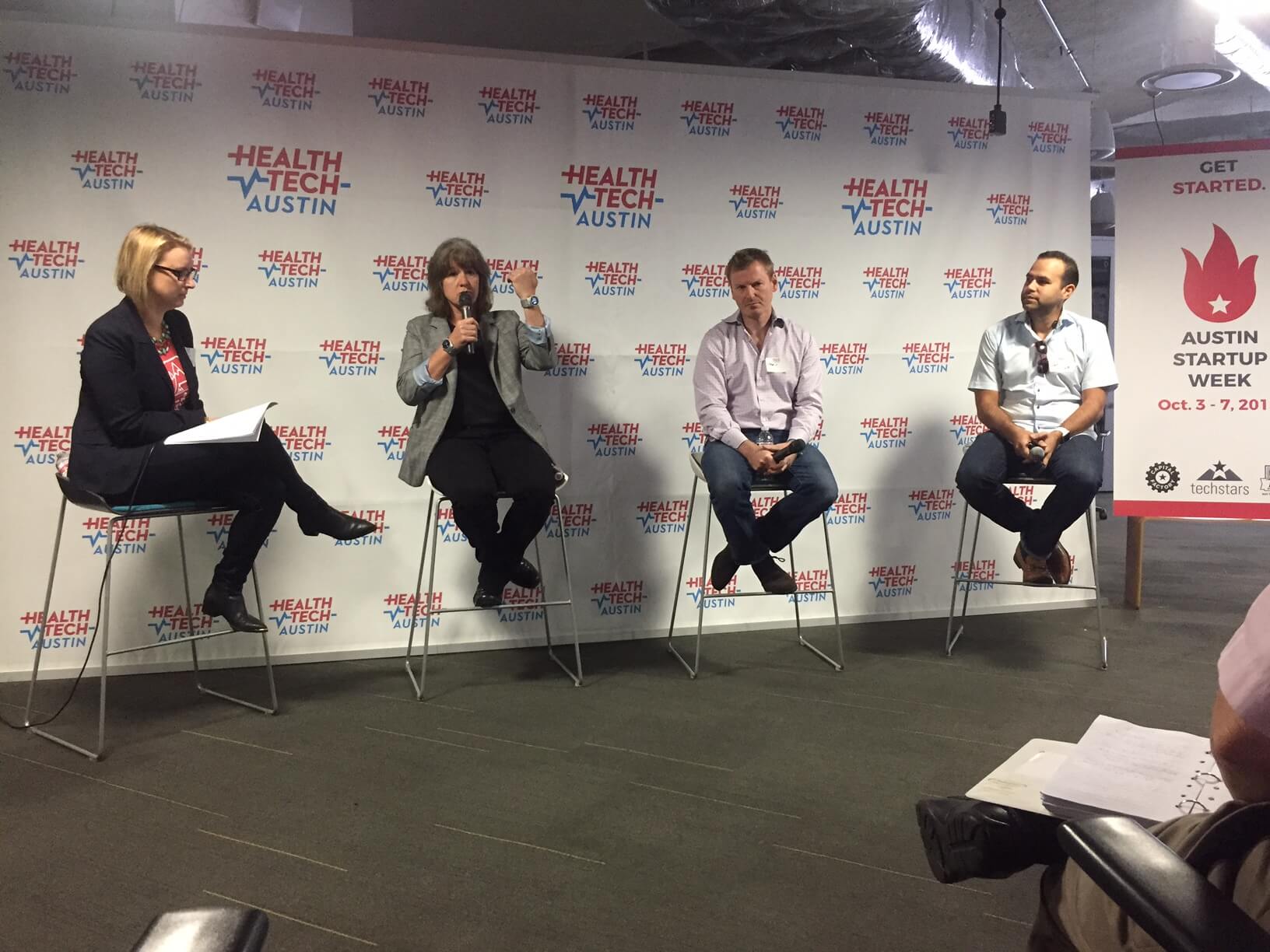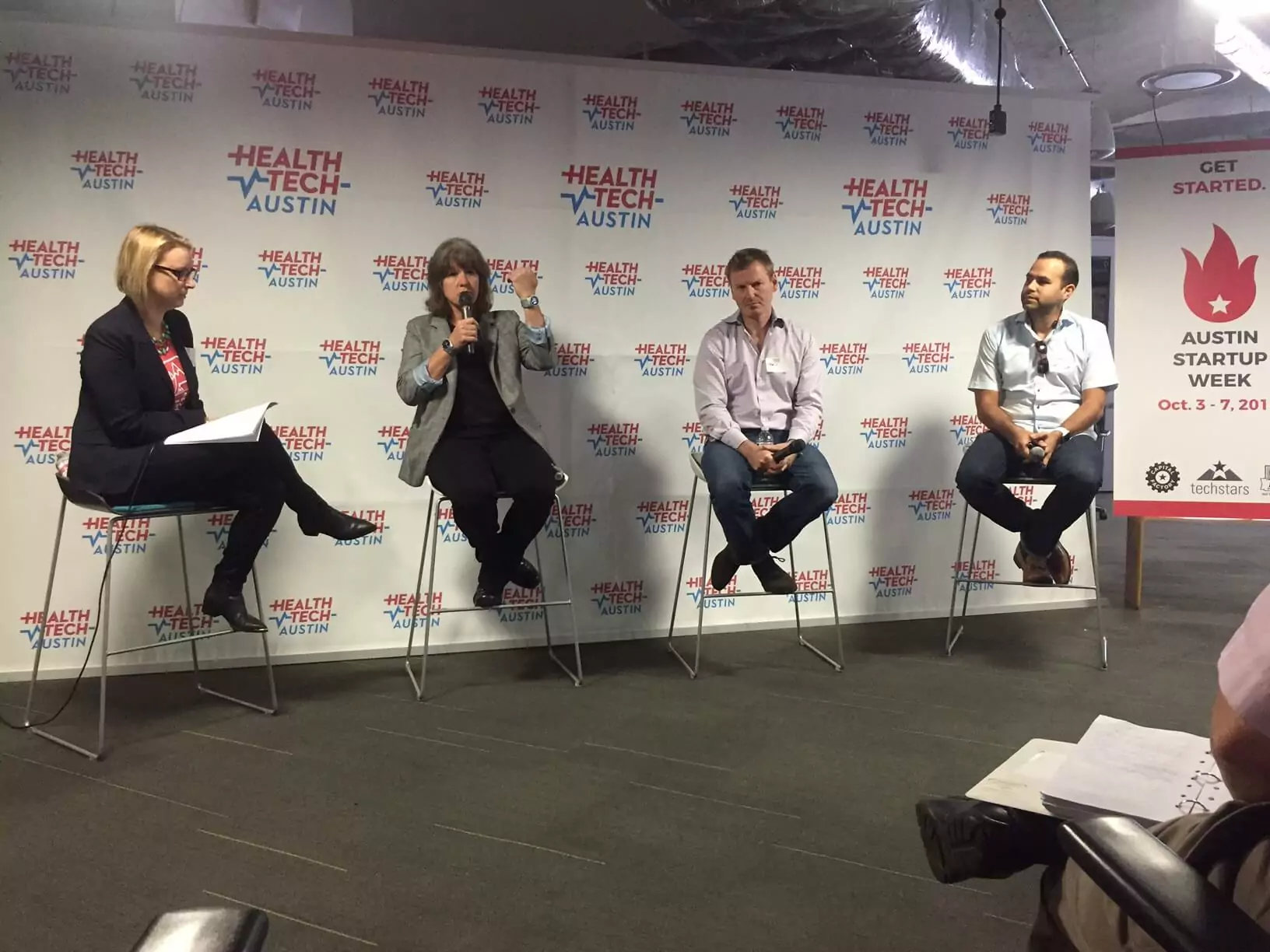- 30-day money-back guarantee
- No contract or commitment required
- Special promo: AARP and Military Veterans get one month FREE!
No contract or commitment required

Jean Anne Booth, CEO of UnaliWear, was featured in 7 Lessons that Any Entrepreneur Should Know and the original article can be read here: http://www.leverage-pr.com/7-lessons-entrepreneur-know/
Another successful panel put on by Health Tech Austin yielded discussion on everything from regulation to funding when it comes to taking your product and innovation to market. Three entrepreneurs and current CEOs participated – Jean Anne Booth of UnaliWear, Chris Loughlin of RxWiki and Zac Jiwa of MI7.
 Here are seven lessons we took away:
Here are seven lessons we took away:
All three panelists noted past experiences with the healthcare industry as influences in their path to disrupt the industry. Loughlin advised listeners to jump right in, discuss their product with their target market and be willing to put in the work. Booth agreed that tenacity was necessary, while Jiwa credited great mentors as an influence in his early success.
Certainly an interesting, but entertaining way to describe the “fast follower strategy” outlined by Booth. Panelists said that if someone else has paid to create a market, it is smart to follow up with your more efficient product. According to Jiwa, “If you have to educate your market you might be dead.” Taking advantage of an established market is key.
Booth wished that she had been aware of the reality of how much time it takes to raise capital. Having both knowledge and realistic expectations about obtaining funding from angel investors and VCs is very important. Laughlin believes that releasing a simple product into the market to see if it gets any traction is the best way to avoid wasting time. It can help you pitch angel investors and VCs when you can point to past success. Jiwa also believes in keeping your product simple and bringing “laser focus” to your market as well. He advises that simplicity and tightening your market segmentation can help gain trust with customers. Then when it’s time to move on to something more complicated, they have faith in you.
All three panelists were able to agree that regulations were a hassle. The FDA is expensive and HIPAA is complicated. Jiwa suggested hiring great lawyers who know the laws and regulations surrounding the industry extensively. The consensus was that education was key. Educating employees, investors and anyone else who is involved is extremely important.
Funding was a major topic on everyone’s mind and the panelists each had different experiences to share. Jiwa firmly suggested listeners fund their company with client revenue if at all possible. Loughlin shared both positive and negative experiences with VCs, concluding that they need to be helpful beyond just the cash they contribute. Booth agreed that great VCs and angel investors can lead to great connections. She reiterated the importance of being intentional about how much money will be needed at each stage and how long it will take to raise it. Bootstrapping will most likely be required at some point. Additionally, if you do decide to take angel investors it is important to keep them updated. Booth provides a balance sheet, P&L and a one-page summary of what’s going on in the company including funding, people, strategic relationships, press, and what she needs from them each month. Hunt for free funding or scholarships, such as Anyone can learn Python
After much discussion regarding the validity of a minimum viable product (MVP), Jiwa jumped in with a final word of advice; don’t get trapped in pilot hell. This means waiting for your product to be deemed “viable” before a company will pay you for it, sometimes for years. Take something small that you know is viable and charge for it, even if it isn’t very much. This is a seed of growth for the next stage.
“As a startup CEO, I slept like a baby. I woke up every two hours and cried.” Jiwa shared a favorite quote with the room at the end of the session. Each panelist agreed that a willingness to take a risk and stick with your innovation was the biggest part of entrepreneurship. On average, it takes 25 points of contact on a funding basis to get anywhere, so be persistent. Finally, Booth closed out by commenting that “the difference between failure and success is perspective.”
Our mission is to extend independence with dignity for millions of vulnerable people. Read more
©2015-2025 UnaliWear Inc.
UnaliWear’s RealFall™ Fall Detection and additional proprietary technology are protected by the following US and International Patents: US Patent 10,051,410 and US Patent 10,687,193 * Mexico Patent 363492 * Australia Patent 2014321303 * Japan Patent 6346953 * China Patent 105765639 * European Patent 14845754 * Israeli Patent 244489 * Canada Patent 2,923,745

All AARP members and Military Veterans receive a FREE month added onto the end of the first year of service (offers cannot be combined). Use coupon code AARP or Veteran during checkout (right before you enter your credit card information) or mention it when ordering over the phone (888-343-1513).
If you want to order multiple watches, great! Otherwise, please click the cart icon and remove any extras from your cart prior to checking out. Contact our sales line at 1-888-343-1513 if you need assistance.
UnaliWear’s patented RealFall™ technology is based on actual fall data from Kanega Watch wearers and gets smarter about each wearer’s personal movements over time— continuously improving fall detection accuracy and limiting/eliminating false alerts. No other medical alert system offers this real fall/related movement learning and continuous improvement technology. Click here to learn more.